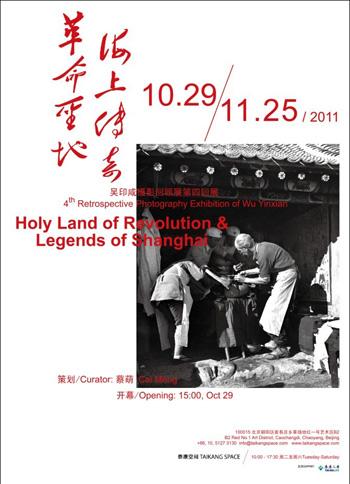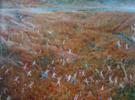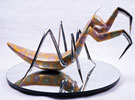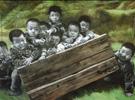
展览时间:2011-10-29 ~ 2011-11-25
展览地点:泰康空间
策 展 人:蔡萌
参展艺术家:吴印咸
开幕时间:2011-10-29 (周六) 15:00
展览介绍:
自2009年11月“吴印咸摄影回顾展”第一回展在泰康空间的成功举办起,历经3年不断地推进和探索,吴印咸,这位在中国摄影史上极具代表性和影响力的摄影家,其在20世纪七、八十年代拍摄的人民大会堂和北京饭店,五六十年代拍摄的反映社会生活、劳动、工业、风景、肖像、教学、花卉、女民兵等众多题材的摄影作品被分为三次集中地呈现出来。
本次展览作为“吴印咸摄影回顾展”的最后一回,将展出吴印咸拍摄于上世纪三、四十年代的一批包括上海和延安两个时期的作品。
其中30年代上海时期的一批原始照片,由吴印咸先生亲手印放并粘贴在手工相册中,画面精致、制作精良。从电影明星到白领阶层到穷苦民众、从都市风光到名胜古迹,我们能够看到一个精力充沛的青年创作者在那个20世纪最为黄金的10年中,通过摄影与时代建立的一种关系,以及在这种关系构建过程中开始明确的对摄影认知。这一时期他对于黑白影调的实验尝试几乎同步于西方摄影的探索。更为重要的是,这批照片是迄今为止第一次正式地公开发表。
本次展览的另一个重点是从吴印咸先生拍摄于40年代延安时期近千张照片中,挑选出的一批不仅具有珍贵历史文献价值,而且具有一定艺术价值的作品。通过作品,我们不难发现它们依然延续了上海时期沙龙摄影的经验与趣味,而且被注入到一种新的摄影生态和社会现实之中,并赋予其新的社会理想、政治意义与家国情怀。
吴印咸生前创作的数以万计的照片现今都完好的保存在其家属手中,这四次展览我们都得到了吴家后人的大力支持,有幸从吴老生前留下的大量原作中挑选出其中的精品,从而感受摄影原作的魅力。在此,我们特别对吴筑清女士和吴炜先生的支持表示感谢!
展览还将同时展出吴印咸生前的手稿、出版著作、自制影集、照片册、照片小样,以及当时相关的图片历史资料;同时,还将放映吴印咸先生创作于延安时期的两部纪录影片《白求恩》和《南泥湾》,敬请观摩。
附件:
吴印咸:
吴印咸生于1900年9月21日,1994年9月7日逝世于北京,江苏沭阳县人。中国著名摄影艺术家,曾担任过延安八路军总政治部电影团摄影队长,主持电影团工作,东北电影制片厂技术部长、副厂长、厂长,北京电影学院副院长兼摄影系主任,文化部电影局顾问,中国摄影家协会副主席、名誉主席,中国电影摄影师学会副理事长、名誉主席,全国文学艺术联合会委员。
吴印咸先生与世纪同龄,他是中国革命史上许多重大事件的参与者和纪录者。他用手中的摄影机和照相机,站在时代和历史的潮流中,忠实地记录着中国民主革命、社会主义革命和建设、改革开放的风云际会。在长达70年的摄影艺术生涯中,拍摄了数万张黑白和彩色照片;拍摄了7部故事片和5部纪录片,曾获得全国电影“百花奖”的“最佳摄影奖”;编著了20多本摄影艺术专著;举办了近20次个人摄影展览。
Since the successful mounting of “Wu Yinxian Photography Retrospective, Part I” at Taikang Space in November 2009, we have carried on explorations of his oeuvre over the past three years. Mr. Wu Yinxian is a highly representative and strongly influential figure in the history of Chinese photography. In the 1970s and ‘80s Mr. Wu photographed monumental architecture such as the Great Hall of the People and Beijing Hotel. In the 1950s and ‘60s his works ranged from social relations, labor and industry to landscapes, portraits, classroom scenes, gardens and female militia members. His photographic works from the 1950s through the ‘80s were divided into three parts for presentation here.
The present exhibition, being the fourth installment of “Wu Yinxian Photography Retrospective,” will display Mr. Wu’s works shot in the 1930s and ‘40s, during his Shanghai and Yan’an periods. Original photos taken during the 1930s in Shanghai were personally printed by Wu Yinxian and pasted into handmade scrapbooks. The layouts are elegant and the craftsmanship exacting. His pictures range from movie stars and white collar workers to destitute common people, from urban glamour to historical sites. In these works we see an energetic young innovator, during China’s golden decade of the 20th Century, establishing a connection to his own era through photography; we can also see how he clarified his understanding of photography in the process of building this connection. His experiments with black and white shading were nearly simultaneous with similar explorations being done in the West.
The other point of emphasis in this exhibition falls on photographs shot by Wu Yixian during the 1940s in Yan’an. The selection presented here is precious not only in terms of historical documentation but also for artistic value. Viewing these works, one readily discovers them to be an extension of Wu Yinxian’s experience and taste from his Shanghai period. What is more, being transposed to the dynamic context of a new social reality endows these works with new ideals, political significance and concern for homeland.
During his lifetime Wu Yinxian created tens of thousands of photographic works, which are now preserved intact in the hands of his relatives. For these four exhibitions, we have received generous support from Wu Yinxian’s family. Thus we have been privileged to select prime items from a large amount of original material, allowing us to feel the powerful appeal of the original works. Here we wish to express special thanks to Ms. Wu Zhuqing and Mr. Wu Wei.
This exhibition will also display manuscripts written by Wu Yinxian during his lifetime, along with publications, handmade scrapbooks and photo albums, photo proofs and relevant historical materials. At the same time, we will screen two documentaries which Wu Yinxian filmed while in Yan’an: Norman Bethune and Naniwan. We respectfully invite you to view these offerings.
Related Materials:
Wu Yinxian (1900-1994)
Wu Yinxian was born on 21 September 1900 in Shuyang County, Jiangsu Province, and passed away on 7 September 1994 in Beijing. He was a famous Chinese photographer, and held positions as Leader of the Cinematographic Team of the Yan'an Eighth Route Army General Political Department Film - making Team (chairing the film - making work); at Northeast Film Studios he was Director of the Technical Department, Studio Vice - Director and Studio Director. He was Associate Dean and Head of Photography at the Beijing Film Academy, Film Board Adviser for the Ministry of Culture of China, Vice - Chairman and Honorary Chairman of the China Photographers Association; and Committee Member of the National Literary and Artistic Federation.
Mr. Wu Yinxian was the same age as the twentieth century, and he participated in and recorded many of the great historical events in the history of the Chinese Revolution. He used the film cameras and cameras at hand and, standing in the current of his era and of history, he faithfully recorded the great moments of the Chinese Democratic Revolution, the Socialist Revolution, and the periods of Construction and of Reform and Opening. In a career that spanned seventy years in the art of film and photography, he took tens of thousands of black - and - white and color photographs, shot seven feature films and five documentaries, and achieved national film prizes the Hundred Flowers Award and the Best Cinematography Award. He edited more than twenty monographs on the art of photography and held close to twenty solo photography exhibitions.
- 2011-10-22 ~ 2011-12-05平乏中的诗意──乔治·泰斯的摄影作品
- 2011-10-22 ~ 2011-11-20大时代——邓霄个展
- 2011-09-03 ~ 2011-10-02平安的世界——大卫·斯考皮克个展
- 2011-11-04 ~ 2011-12-04她说——彭韫作品展
- 2011-10-30 ~ 2011-11-19流浪者 上海——米洛万·德史迪·马尔科维奇个展
- 2011-11-05 ~ 2011-12-16七层壳——邬建安作品展
- 2011-10-29 ~ 2011-12-11龙生九子──隋建国师生作品展
- 2011-11-05 ~ 2011-12-25光域——王岱山作品展
- 2011-10-29 ~ 2011-11-08生息——爱的延续
- 2011-10-30 ~ 2011-12-11《人·幸》——影像群展




